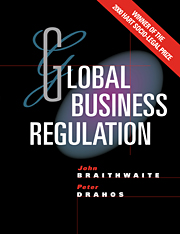22 - Mechanisms of Globalization
Published online by Cambridge University Press: 04 August 2020
Summary
Mechanisms of the globalization of business regulation are social, economic or political processes that increase the extent to which patterns of regulation in one state are similar to or linked to patterns of regulation in other states. As such, we can call processes at very different levels of abstraction ‘mechanisms'. Speech is a higher-order mechanism of globalization under this definition. We have chosen to define our mechanisms at a level of abstraction that inductively our histories of globalization show to be illuminating (see Chapter 4). This causes us to opt for the more recurrently concrete mechanisms of military coercion, economic coercion, systems of reward, reciprocal adjustment, non-reciprocal coordination, modelling and capacity-building.
Military Coercion
Under this mechanism, globalization of regulation is achieved by the threat, fear or use of military force. Table 22.1 shows that it is far from the most consistently important mechanism of globalization. In some domains where almost all the globalization has occurred since the Second World War, such as environment and motor vehicle standards, there are no spécifie globalizations of regulatory standards that can be attributed to military coercion. Nevertheless, military coercion turned out to be much more important than we expected at the commencement of this study.
Even with regimes where almost all the globalization occurred after the Second World War, one might say there is an indirect effect of the war. This chapter shows that by far the most important single actor during this period in the range of domains we have studied is the US state, a hegemony that was considerably secured on the battlefields of Europe and the Pacific.
Military coercion is least important with less foundational forms of regulation such as motor vehicle standards, and most important with the forms of regulation which have been constitutive of the very possibility of global capitalism. While the institutions of property diffused first through the mechanisms of modelling, their further diffusion was coerced and solidified when empires that conquered expanding territories stood behind them. The most important of these was the Roman empire. But before then Persian and Greek armies, among others, spread as far as India the idea that a single currency should be legal tender across vast expanses of territory ruled by a centralized monetary policy and, later, a unified tax administration.
- Type
- Chapter
- Information
- Global Business Regulation , pp. 532 - 549Publisher: Cambridge University PressPrint publication year: 2000



